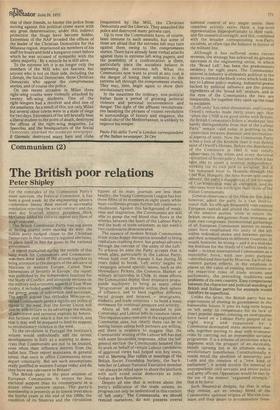The British poor relations
Peter Shipley
For the comrades of the Communist Party's inner sanctum, the Political Committee, it has been a good week. At the engineering union's conference Jimmy Reid moved a successful resolution rejecting the social contract and the next day Scottish miners' president Mick McGahey added his voice to oppose any form of wage restraint. The British Communist Party was not alone in feeling events were moving its way: the Italian party nudged closer to the Christian Democrats in that country's regional elections, to place itself in line for posts in the national government. A report published during the middle of this busy week for Communists and Communistwatchers drew some of the strands together to bring attention to the dangers of the advance of Marxism in western Europe. Called 'New Dimensions of Security in Europe,' the report was published by the independent Institute for the Study of Conflict, and alongside sections on the military and economic aspects of East-West rivalry, it included some timely observations on the greyer areas of subversion and terrorism. The report argued that orthodox Moscow-oriented Communism poses a significant political threat to the west, that the Soviet Union will also be able to turn to its advantage the results of subversive and terrorist exploits by heterodox factions over which it has no control, and that it may well be prepared to lend its support to revolutionary violence in the west. To the revolution in Portugal the Institute's writers would undoubtedly add the recent developments in Italy as a warning to democrats that Communists are not to be, trusted, even when their influence derives from the ballot box. Their report maintains, in general terms, that once in office Communists never depart voluntarily. But are such assumptions really justified in western Europe today and do they have any relevance to Britain? The British party is the poor relation of European Communism. It enjoys far less electoral support than its counterparts in a dozen other western states. The party's membership is presently at its lowest level since the fateful years at the end of the 1950s, the condition of its finances and the circulation figures of its main journals are . less than healthy, the Young Communist League has lost three-fifths of its members in eight years, while more vociferous groups further left continue to mushroom. Against this background of weakness and stagnation, the Communists are still able to pump the red blood that flows in the arteries between the heart of the Labour Party and the body of trade unionism, as last week's two conferences demonstrated.
The essence of modern British Communism is not strike-happy disruption intended to bring capitalism crashing down, but gradual advance through the concept of 'the unity of the Left.' To achieve its aims the Party accepts that it needs allies, particularly in the Labour Party, whose hold over the masses it has during 55 years failed to break. 'Left unity' begins on campaigns around specific issues, such as the Shrewsbury Pickets, the Common Market or military dictatorship in Chile. In these efforts the Communists deploy their extensive propaganda machinery to bring as many other "progressives" as possible within their sphere of influence, and to bind together different social groups and interest — immigrants, students, and trade unionists — to build a mass movement for continual pressure and activity.
Above all 'left unity' is intended to join Communist and Labour lefts in common cause. This requires some restraint in the exposition of Communist aims, but clearly there can be no lasting liaison unless both partners are willing, and there is evidence to suggest that the Communists' wooing of the Labour left has met with some favourable responses. After the last general election the Communists boasted that its work on behalf of certain Labour candidates of approved views had helped win key seats, and at Morning Star rallies or meetings of the British Soviet Friendship Society, the backbencher or Labour National Executive member can always be relied upon to share the platform with such noted social democrats as John Gollan or Bert Ramelson.
Despite all else that is written about the party's infiltration of the trade unions, its progress can only be understood in this context of left unity.' The Communists, we should remind ourselves, do not possess overal


































 Previous page
Previous page